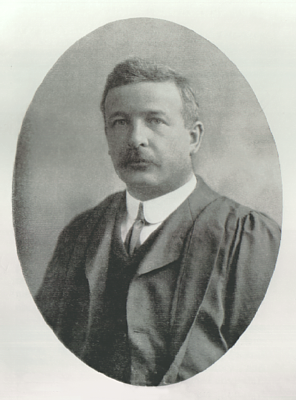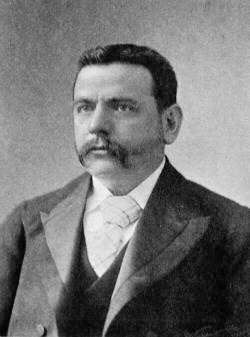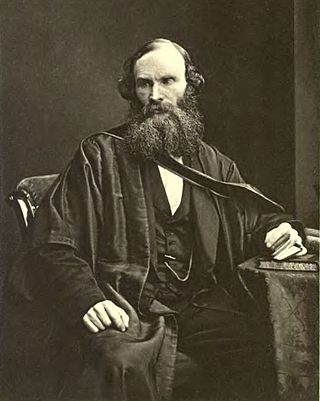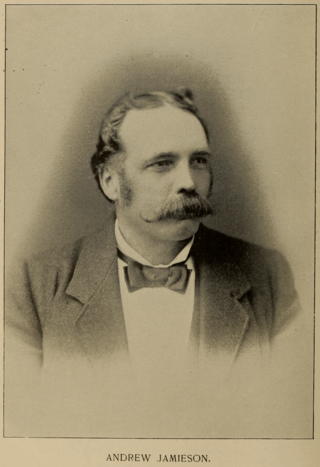
William Thomson, 1st Baron Kelvin was a British mathematician, mathematical physicist and engineer. Born in Belfast, he was the professor of Natural Philosophy at the University of Glasgow for 53 years, where he undertook significant research and mathematical analysis of electricity, was instrumental in the formulation of the first and second laws of thermodynamics, and contributed significantly to unifying physics, which was then in its infancy of development as an emerging academic discipline. He received the Royal Society's Copley Medal in 1883 and served as its president from 1890 to 1895. In 1892, he became the first scientist to be elevated to the House of Lords.

William John Macquorn Rankine was a Scottish mathematician and physicist. He was a founding contributor, with Rudolf Clausius and William Thomson, to the science of thermodynamics, particularly focusing on its First Law. He developed the Rankine scale, a Fahrenheit-based equivalent to the Celsius-based Kelvin scale of temperature.

William John Watson was a toponymist, one of the greatest Scottish scholars of the 20th century, and was the first scholar to place the study of Scottish place names on a firm linguistic basis.

The Royal Philosophical Society of Glasgow is a learned society established in 1802 "for the improvement of the Arts and Sciences" in the city of Glasgow, Scotland. It runs a programme of lectures, starting its 222nd Series in October 2023. The Society formerly owned a building on Bath Street.

John Macintyre or Mcintyre FRSE was a Scottish medical doctor who set up the world's first radiology department at the Glasgow Royal Infirmary, in Glasgow.

James Thomson FRS FRSE LLD was a British engineer and physicist, born in Belfast, and older brother of William Thomson.

The Institution of Engineers in Scotland (IES) is a multi-disciplinary professional body and learned society, founded in Scotland, for professional engineers in all disciplines and for those associated with or taking an interest in their work. Its main activities are an annual series of evening talks on engineering, open to all, and a range of school events aimed at encouraging young people to consider engineering careers. Between 1870 and 2020 the institution was known as the Institution of Engineers and Shipbuilders in Scotland (IESIS).
James Blyth was a Scottish electrical engineer and academic at Anderson's College, now the University of Strathclyde, in Glasgow. He was a pioneer in the field of electricity generation through wind power and his wind turbine, which was used to light his holiday home in Marykirk, was the world's first-known structure by which electricity was generated from wind power. Blyth patented his design and later developed an improved model which served as an emergency power source at Montrose Lunatic Asylum, Infirmary & Dispensary for the next 30 years. Although Blyth received recognition for his contributions to science, electricity generation by wind power was considered uneconomical and no more wind turbines were built in the United Kingdom until 1951, some 64 years after Blyth built his first prototype.
John Samuel Forrest FRS was a Scottish-born physicist, writer and Professor Emeritus, University of Strathclyde.
James Thomson Bottomley was an Irish-born British physicist.
Lawrence Crawford FRSE LLD (1867–1951) was a Scottish-born mathematician. He was a co-founder of the re-established Royal Society of South Africa in 1908 and served as its President from 1936 to 1941. He was an expert on the Lame function, Mathieu function and proved Klein's theorem.

Dr Andrew Freeland Fergus FRSE LLD (1858–1932) was a Scottish ophthalmic surgeon. He was President of the Royal College of Surgeons in Glasgow, President of the Chirurgical Society, President of the Royal Philosophical Society of Glasgow, and President of the Greenock Faculty of Medicine.
George Alexander Gibson FRSE LLD was a Scottish mathematician and academic writer.
Albert Alexander Gray FRSE was a British physician and otologist.

William Jack FRSE was a Scottish mathematician and journalist. He was Editor of the Glasgow Herald newspaper from 1870 to 1876, and Professor of Mathematics at the University of Glasgow from 1879 until 1909.

Andrew Jamieson (1849–1912) was a Scottish engineer and academic author.
John Mackintosh Mackay Munro FRSE MIME MICE (1853-1925) was a Scottish businessman and electrical engineer.
Dr James Robert Erskine-Murray FRSE MIEE (1868-1927) was a Scottish electrical engineer and inventor. A protege of Lord Kelvin, he also worked with Marconi and was a pioneer in the development of the telegraph. He wrote extensively on telegraphy and wireless communication.
Peter Pinkerton FRSE (1870–1930) was a Scottish mathematician who served as Rector of Glasgow High School.
Herbert Fitton Stockdale FRSE LLD (1865–1951) was a 19th/20th century British university administrator.








